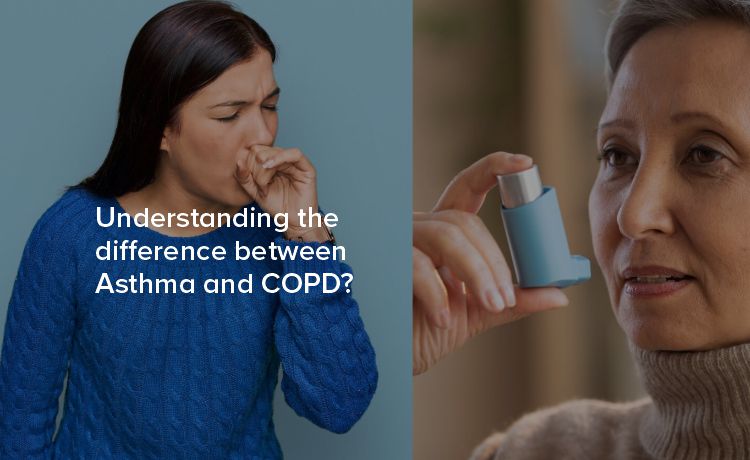
Breathing should be simple, but for millions of people around the world, it's a daily struggle. If you've been diagnosed with a respiratory condition, or know someone who has, you've probably heard the terms "Asthma" and "COPD." But what exactly do these terms mean? And how do these conditions differ?
Asthma is a chronic condition that affects the airways in your lungs. It causes inflammation and narrowing of these airways, making it difficult to breathe. People with asthma often experience episodes of wheezing, shortness of breath, chest tightness, and coughing.
Asthma can be triggered by various factors such as allergens, exercise, cold air, and even stress. The condition is usually diagnosed in childhood, although it can develop at any age. Unlike some respiratory conditions, asthma symptoms can vary greatly between individuals and can change over time.
Chronic Obstructive Pulmonary Disease (COPD) is an umbrella term used to describe progressive lung diseases, including emphysema and chronic bronchitis. COPD is characterized by long-term breathing problems and poor airflow. The condition tends to worsen over time and is primarily caused by long-term exposure to be irritating gases or particulate matter, most often from cigarette smoke.
Unlike asthma, which can have episodes of normal breathing between attacks, people with COPD experience constant breathing difficulties. This condition is typically diagnosed in middle-aged or older adults and is a leading cause of death and disability worldwide.
Understanding the differences between asthma and COPD is crucial for effective treatment and management. While both conditions affect the lungs and cause breathing difficulties, they are distinct in several ways.
Age of Onset:
Asthma is often diagnosed in childhood, while COPD is typically diagnosed in adults over the age of 40.
Symptoms:
Asthma symptoms can come and go, while COPD symptoms are usually persistent and progressive.
Triggers:
Asthma is often triggered by allergens or environmental factors, whereas COPD is primarily caused by long-term exposure to harmful substances, particularly cigarette smoke.
Reversibility:
Asthma symptoms can often be reversed with medication, while COPD causes permanent damage to the lungs.
Recognizing the symptoms of asthma can help you seek treatment early and manage the condition effectively. Some common symptoms include:
COPD symptoms develop slowly and worsen over time. Some of the most common symptoms include:
Though the exact cause of asthma is unknown, several factors can increase your risk of developing the condition. These include:
The primary cause of COPD is long-term exposure to lung irritants. The most common risk factors include:
Diagnosing asthma involves a combination of medical history, physical examinations, and specific tests. These tests may include:
Spirometry:
This test measures how much air you can exhale after a deep breath and how quickly you can do it.
Peak Flow Meter:
A simple device that measures the strength of your exhalation.
Allergy Testing:
Identifies allergens that may trigger asthma symptoms.
Diagnosing COPD also involves a detailed medical history and physical examination, along with specific tests:
Spirometry:
This is the most common test for diagnosing COPD and assesses lung function.
Chest X-Ray or CT scan:
These imaging tests can show emphysema, one of the main components of COPD.
Arterial Blood Gas Analysis:
Measures oxygen and carbon dioxide levels in your blood to see how well your lungs are working.
While there is no cure for asthma, there are many treatments available to manage symptoms and improve quality of life. Treatment options include:
Inhalers (Bronchodilators):
These helps open up the airways and make breathing easier.
Anti-inflammatory medications:
Such as corticosteroids, to reduce inflammation in the airways.
Allergy medications:
To manage allergic triggers that can cause asthma attacks.
Though there is no cure for COPD, treatments can help manage symptoms and improve quality of life. These treatments include:
Bronchodilators:
Medications that help relax the muscles around the airways.
Inhaled steroids:
To reduce airway inflammation.
Oxygen therapy:
To maintain adequate oxygen levels in the blood.
Pulmonary rehabilitation:
Programs that include exercise training, nutrition advice, and education.
Managing asthma involves making lifestyle changes to reduce exposure to triggers and maintain good health:
Avoiding Triggers:
Identify and avoid allergens and irritants that can cause asthma attacks.
Regular Exercise:
Exercise can strengthen your lungs and improve overall health but consult your doctor about safe activities.
Healthy Diet:
A balanced diet can help maintain overall health and reduce inflammation.
Living with COPD requires making several lifestyle adjustments to manage symptoms and improve quality of life:
Quit Smoking:
The most critical step to slowing the progression of COPD.
Healthy Diet:
A balanced diet can help maintain energy levels and overall health.
Regular Exercise:
Physical activity can improve endurance and muscle strength.
Both asthma and COPD can significantly impact daily life. Having a robust support system can help you manage these conditions more effectively:
Family and Friends:
Their support can provide emotional comfort and practical help.
Healthcare Providers:
Regular check-ups and open communication with your healthcare team are crucial.
Q: Can asthma turn into COPD?
A: While asthma and COPD are distinct conditions, long-term poorly controlled asthma can lead to remodeling of the airways, which can resemble COPD.
Q: Can you have both asthma and COPD?
A: Yes, it is possible to have both conditions, a situation known as Asthma-COPD Overlap Syndrome (ACOS).
Q: Is COPD always caused by smoking?
A: While smoking is the leading cause, non-smokers can also develop COPD due to exposure to other lung irritants and genetic factors.
Understanding the differences between asthma and COPD is essential for effective management and treatment. Both conditions require careful attention to symptoms, triggers, and lifestyle adjustments contact with Citizens Specialty Hospital for chronic diseases treatment in Hyderabad.